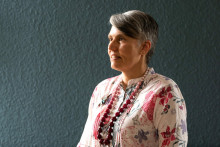‘I got my Master’s degree in hydrogeology in Australia. When deciding where to do my PhD research, I didn’t want to just fill in an empty spot at some department. I knew I wanted to find a place and topic that will apply to my own country,’ says Moiteela Lekula, who has also worked as a hydrogeologist for Botswana government, helping to manage the country´s water resources.
Groundwater is the main water source
The main goal of Lekula’s PhD research is to assess the impact of climate change on groundwater resources in the Central Kalahari Karoo Basin, which is Botswana’s most productive basin in terms of groundwater. ‘About 80% of Botswana relies on groundwater supplies; there are very few surface water sources. However, the groundwater supplies are threatened by climate changes, such as changes in rainfall,’ explains Lekula.
‘My goal is to study and calculate changes in groundwater storage in time. It is an original and very ambitious research, first one in the country.’ Ambitious seems a fitting word as Lekula’s research covers the area of roughly 400 000 km².
A lot of fieldwork
Because it’s the first project of its type, it also requires a lot of fieldwork. Lekula says: ‘I spend a lot of time out there. In order to collect all necessary data, I already went to the Kalahari basin to install rain gauges and mini-weather stations that measure wind speed, temperature, humidity and sunlight. Existing rain gauges were not adequately distributed within the whole – very large - area.’ To assess changes over time, Lekula also uses historical data collected by the government and will soon employ satellite data.
Working with something you can´t see
‘There aren’t many people here focusing on groundwater,’ mentions Lekula. ‘It is difficult to study something you can’t see. We have to rely on measurements and make good decisions in order to advise policy makers.’
Lekula, indeed, plans to go back to Botswana and use his future findings to help allocate Botswana´s existing water storage appropriately. First he needs to establish how limited the groundwater sources are and what changes they are undergoing. ‘We need to know what we have, so we can manage it.’







